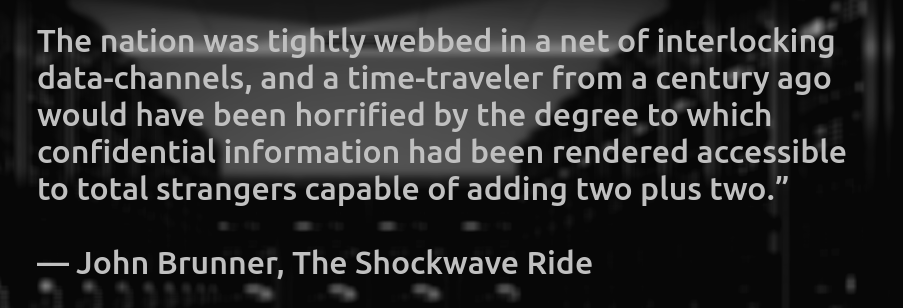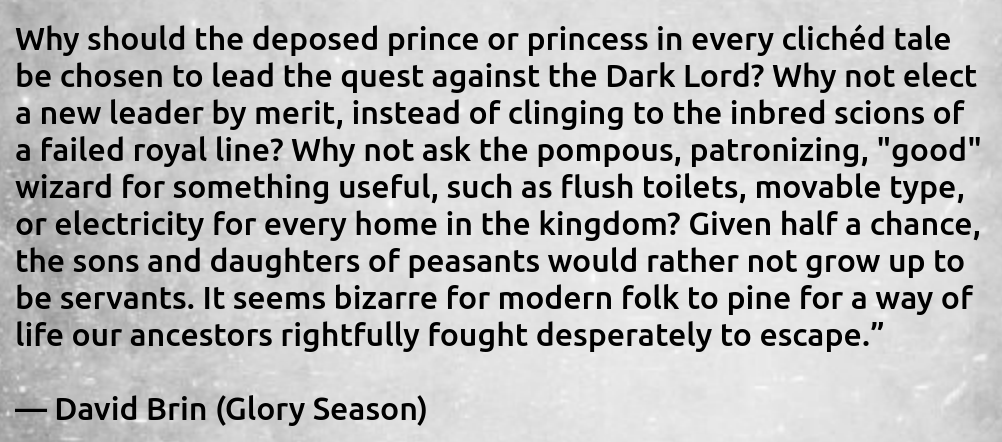
Thursday 9 January 2025 11:49:15 PM CDT
My introduction to
John Brunner
was
Stand on Zanzibar
because it is my mentor's favorite Brunner work. It's generally considered his
magnum opus and while I thus far have only read it and The Shockwave Rider and The Sheep Look Up. I haven't read The Jagged
Orbit as his copy seems to have been mislaid. Those four deal with societal decay and the dystopias that result. Stand on Zanzibar
is from 1968 and the The Shockwave Rider is from 1975 - fifty years ago.
The Shockwave Rider could be about today as Stand on Zanzibar got a lot of things right about the early twenty-first century.
I don't know how much John Brunner had in common with
Robert Heinlein
philosophically - Brunner was reputedly a liberal but in the 1970s and
even into the 1980s liberals weren't what they had become by 2000. Heinlein was what most would call a libertarian and - politically anyway - has
become rather fringy. Being one myself I would never vote for a Democrat and when voting for Republicans consider myself choosing the lesser of two
evils. What are called liberals today enthusiastically vote for Democrats. Both Heinlein and Brunner saw the problems with sheeplike populations
that fail to prevent corrupt governments from overrunning them and using them for cheap labor and cannor fodder in wars that rarely serve a good
purpose.
His comment about the degree to which the ability to keep secrets - whether personal justifiably private or information that should be restricted
to authorized persons (military secrets) - can be exposed with relatively little ease. Not all of it - it is possible for a person to have at
least some secrets safe but someone said
'three can keep a secret if two of them are dead'
and some people don't know how to just not say anything. As a friend commented:

While the data collection and transmission/storage/retrieval (TRC) capabilities of businesses and government alike make anything other than a little personal privacy
nearly impossible the information ecosystem has an upside - governments and businesses can't keep secrets either. While only a little leakage is
due to 'hacking' [1] and most is through whistle-blowers that data is exposed the ability of millions of partisans to disseminate it quickly and easily
is a good thing.
I disapproved of Julian Asange at the beginning because some of the leaked information was false. He didn't vet his sources well but it
wasn't the false data that enraged the authorities - they were the ones who created it and passed it off as real. But the determination
to not only muzzle him but make an example of him showed the fear they have of being exposed. I'm still surprised they didn't kill him.
The fact that it would be obvious they did so wouldn't have bothered them any more that it did with Epstein - the threat was eliminated and
those responsible for it would never be held accountable. ~ Damianos
A tangled web indeed. The downside for those who wish to live in peace and freedom is already there - the government has a practically unlimited
budget to surveil and store data and the computing horsepower to process it, slice and dice and twist as desired. But like weapons in the hands of
the people the ability to transmit information freely can only be taken by force. The liberation of Twitter demonstrated how just one tool being
taken out of the hands of the regime and given to the people can do considerable damage to its ability to control. Being able to lock down the
Internet is the dream of the enemy and while seizing weapons would be much easier if people couldn't communicate so easily it would still be
impossible with tens of millions of armed partisans - many heavily armed and not shy about using them if pushed too far - against about a million
army (half of which would desert and join the rebels) and maybe a couple hundred federal 'law enforcement' types who are also dispersed around
three million square miles we may have come close to seeing it tried:
Had the Democrats remained in power I don't want to think about what could have happened. I believe the scenario described in MacArthur's Freehold may
be close. These people were sufficiently delusional as to believe they could do it. I suspect we dodged a big bullet - not just a .30-30 or even a
.308 but maybe a .460 Weatherby. ~ Marlenus
Are sufficiently delusional I should think. Some in the Democrat party and its various organs and its own masters have not given up. The most any are
doing is trying to find ways to appear less evil and return to power. This is a time unlike any other in American history. If the Republicans can avoid the
common practice by both parties of losing seats in Congress in the midterms much can be accomplished. President Trump has one of the best and brightest group
of counselors in history. Perhaps the best ever and having learned from past mistakes he can make at least as much progress as President Reagan did in his
first term even though conditions are much worse. If he succeeds VP Vance should have little trouble winning in 2028. If there is indeed a strong wind
of change in our favor he should do two terms. Twelve years of strong conservative rule - this time Republican would merely a name but in the other direction -
should to a lot to make a better world not just for the USA but the rest of the world.

[1] A certain friend who is quite a bit older than me deplores the use of the term 'hacking' do describe security breaches. He wrote IBM mainframe assember
and Fortran and COBOL in the 1970s (and something called LAMP today - apparently it's what makes the Internet work) and hacking meant either amateur coding
(or some other craft) or a temporary fix (patch) until a more solid solution could be implemented. Most open-source software (what 90% or more of the Internet
is based on) and a whole lot of businesses use was created by hackers. He also despises people who refer to the parking area at airports as 'tarmac' but that's
another story.
The nation was tightly webbed in a net of interlocking data-channels, and a time-traveler from a century ago would have been
horrified by the degree to which confidential information had been rendered accessible to total strangers capable of adding
two plus two.
John Brunner, The Shockwave Rider
Why should the deposed prince or princess in every clichéd tale be chosen
to lead the quest against the Dark Lord? Why not elect a new leader by merit,
instead of clinging to the inbred scions of a failed royal line? Why not
ask the pompous, patronizing, "good" wizard for something useful, such as
flush toilets, movable type, or electricity for every home in the kingdom?
Given half a chance, the sons and daughters of peasants would rather not
grow up to be servants. It seems bizarre for modern folk to pine for a way
of life our ancestors rightfully fought desperately to escape.
David Brin (Glory Season)

